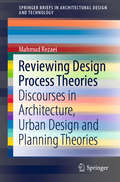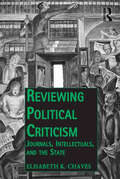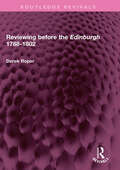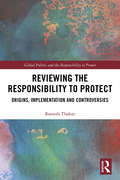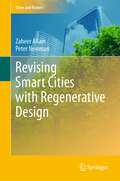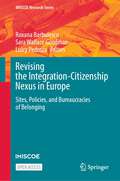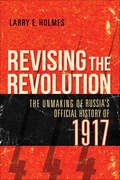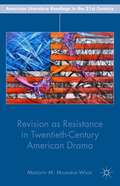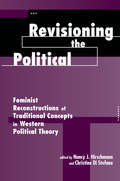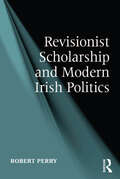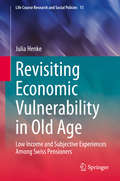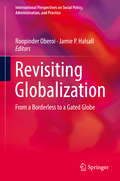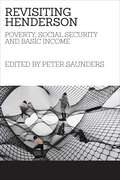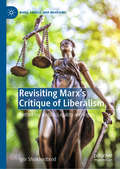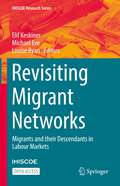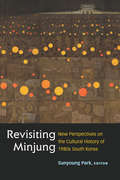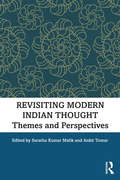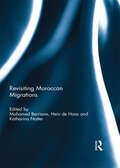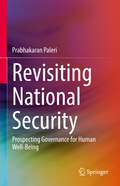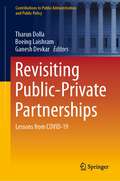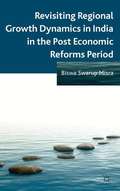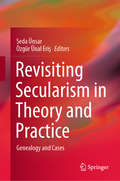- Table View
- List View
Reviewing Design Process Theories: Discourses in Architecture, Urban Design and Planning Theories (SpringerBriefs in Architectural Design and Technology)
by Mahmud RezaeiThis interdisciplinary book explores design theories, combining research from a range of fields including architecture, landscape architecture, urban planning, urban design, industrial design, software engineering, environmental psychology, geography, anthropology, and sociology. Following an extensive review of the current literature, the author reveals eight major types of theory in design processes. The theories are classified as follows: Rational vs. Empiricist Theories, Procedural vs. Substantive Theories, Normative vs. Positive Theories, Design Scopes, Designers vs. People, Form and Space Creation Paradigms, Efficient Tools and Sources in the Design Process, and Place vs. Non-Place Theories. The respective design theories are illustrated with diagrams, tables and figures, condensing the content of over 140 essential theoretical texts that address various aspects of design processes. Given its scope, the book will appeal to undergraduate and graduate students, and to researchers and practitioners in design, urban planning, urban design, architecture, art, etc.
Reviewing Political Criticism: Journals, Intellectuals, and the State (Public Intellectuals and the Sociology of Knowledge)
by Elisabeth K. ChavesReviewing Political Criticism examines the rise of the ’review’ form of journal publication, from the early eighteenth to the early twenty-first centuries. The review belongs to a long tradition of written political criticism that first advised, then revised, and with the increased confidence afforded to civil society by the rise of market capitalism, subsequently challenged and even transformed the state’s view on what and how it governed. Chaves investigates the crucial nexus of intellectual debate with political judgment over this time, and highlights the review’s central role in upholding this connection. Focusing upon critical moments that required the exercise of political judgment, the book explains this journal form as a means of political practice, one that essentially ’re-views’ the state’s view of how society should be ordered. To understand critical activity, one must reflect on where this activity takes place-on the institutions of criticism that sustain it. Referred to by some as the ’natural habitat’ of intellectuals, journals, as the institutionalized sites of theoretical discourse, are often overlooked. This groundbreaking book offers a concentrated critique of the review form of journal publication as a medium for political thought and action, as a decisive site for political judgment by the state’s conservers and critics.
Reviewing before the Edinburgh 1788-1802 (Routledge Revivals)
by Derek RoperFirst published in 1978, Reviewing before the Edinburgh is a study of English literary reviewing during the fifteen years before the founding in1802 of the Edinburgh Review, and an assessment of the reviewers’ achievement. The long introductory chapter describes the aims, methods, staffing, readership, influence, and development of the five important Reviews of the 1790s: the Monthly Review, Critical Review, English Review, Analytical Review, and British Critic. The author argues that this type of Review declined during the 19th century, not because of poor performance, but because the ambitious aim of comprehensive reviewing had become impossible to achieve. The remaining chapters discuss and evaluate the work of these Reviews, chiefly in the fields of poetry, fiction, and political and religious controversy. The book fills a gap in the literary and political history of the period; provides a compact summary of its review criticism; and gives a better perspective on both reviewers and reviewed in years that were unusually fertile in political controversy and literary experiment. It will be of interest to students of literature and history.
Reviewing the Cold War: Approaches, Interpretations, Theory (Cold War History)
by Odd Arne WestadSince the cold war ended, it has become an international field of study, with new material from China, the former Soviet Union and Europe. This volume takes stock of where these new materials have taken us in our understanding of what the cold war was about and how we should study it.
Reviewing the Responsibility to Protect: Origins, Implementation and Controversies (Global Politics and the Responsibility to Protect)
by Ramesh ThakurThis volume is a collection of some of the key essays by Ramesh Thakur on the origins, implementation and future prospects of the Responsibility to Protect (R2P) norm. The book offers a comprehensive yet accessible review of the origins, evolution, advances and shortcomings of the R2P principle. A literature review is followed by an overview of the background, meaning and development of R2P. With a focus on the International Commission on Intervention and State Sovereignty (ICISS), Part I analyses the features of, and explains the factors that make for success and failure of commission diplomacy. Part II discusses the controversies surrounding efforts to implement R2P, including the role and importance of emerging powers. Part III describes the remaining protection gaps and explains why R2P will remain relevant because it is essentially demand driven. Finally, the book concludes with a look back at the origins of R2P and looks ahead to possible future directions. This book will be essential for students of the Responsibility to Protect, and of much interest to students of global governance, human rights, international law and international relations.
Reviewing the Success of Full-Service Community Schools in the US: Challenges and Opportunities for Students, Teachers, and Communities (Routledge Research in Educational Equality and Diversity)
by Mavis G. SandersOriginally published as a special issue of the Journal of Education for Students Placed at Risk, this expanded text provides new insights into the successful, sustained implementation of Full-Service Community Schools (FSCSs) in the United States. Reviewing the Success of Full-Service Community Schools in the US documents the experiences of students, teachers, and communities involved in the establishment and growth of FSCSs. By considering how successful this reform strategy has been in meeting the needs of underserved communities, the text illustrates the potential these schools have to transform students’ learning and outcomes. In particular, the studies illustrate the value these schools have in supporting low-income students and students of color. At the same time, by interrogating the defining pillars of FSCSs – expanded learning opportunities, integrated services, family and community engagement, and collaborative leadership – chapters identify challenges that if left unattended, could limit the transformative potential of this reform strategy. This groundbreaking text will be of great interest to graduate and postgraduate students, researchers, academics, professionals, and policy makers in the fields of Educational Change and School Reform, Multicultural Education, Sociology of Education, Education Policy, and School Management and Administration.
Revising Smart Cities with Regenerative Design (Cities and Nature)
by Peter Newman Zaheer AllamThis book presents a road map to urban regeneration through the contemporary concept of smart cities. It investigates why the concept has gained adoption as it has but until now it has been geared towards a profit-making venture by large corporations and ignoring the economic aspirations of smaller companies and city councils. The technologies can provide enhanced liveability levels if the concept is redefined. This work will be of interest to academics and policy makers looking at exploring how to drive urban regeneration in a sustainable and inclusive fashion while supporting local economies. It presents a case study of Port Louis, Mauritius, with unique insights and data. Academics, policy makers and urban developers could potentially adopt the model and calibrate it to various cities and quantify the economic and social benefits.
Revising the Integration-Citizenship Nexus in Europe: Sites, Policies, and Bureaucracies of Belonging (IMISCOE Research Series)
by Sara Wallace Goodman Luicy Pedroza Roxana BarbulescuThis open access book critically re-examines the theoretical and empirical interconnections between integration and citizenship, specifically, naturalisation. With new, empirical-grounded analyses of what we term 'citizenship-integration nexus' the central, shared contribution is showcasing how membership is informally achieved through everyday integration —usually around, but sometimes in spite of, formal citizenship requirements. By providing evidence of a nexus disjuncture, the book contributes to critical dialogues on immigrant integration and political incorporation, relevant for policymakers, civil society actors, and academics alike.
Revising the Revolution: The Unmaking of Russia's Official History of 1917
by Larry E. HolmesThe clash between scholarship and politics—between truth and propaganda—was ruthless for historians in Istpart, the Russian Communist Central Committee's official historical department.Istpart was tasked with preserving the documentary record, compiling memoirs, and upholding ideological conformism within the national narrative of the 1917 revolution. In Revising the Revolution, Larry E. Holmes examines the role of Istpart's historians, in both the Moscow office and a regional branch in Viatka, who initially believed they could adhere to the traditional standards of research and simultaneously provide a history useful to the party. However, they quickly realized that the party rejected any version of history that suggested nonideological or nonpolitical sources of truth. By 1928, Istpart had largely abandoned its mission to promote scholarly work on the 1917 revolution and instead advanced the party's master narrative. Revising the Revolution explores the battle for the Russian national narrative and the ways in which history can be used to centralize power.
Revision as Resistance in Twentieth-Century American Drama
by Meredith M. Malburne-WadeAmerican dramas consciously rewrite the past as a means of determined criticism and intentional resistance. While modern criticism often sees the act of revision as derivative, Malburne-Wade uses Victor Turner's concept of the social drama and the concept of the liminal to argue for a more complicated view of revision.
Revisioning The Political: Feminist Reconstructions Of Traditional Concepts In Western Political Theory (Feminist Theory and Politics)
by Nancy J HirschmannFeminist scholars have been remaking the landscape in political theory, and in this important book some of the most important feminist political theorists provide reconstructions of those concepts most central to the tradition of political philosophy. The goal is nothing less than the construction of a blueprint for a positive feminist theory.Many of these papers are completely new; others are extensions of important earlier work; two are reprints of classic papers. The result is a progress report on the continuing feminist project to re-envision traditional political theory. As such, it constitutes essential reading not only for feminist thinkers but also for traditional philosophers and political theorists, who will need to come to terms with these contemporary critiques and re-readings.
Revisionist Scholarship and Modern Irish Politics: Revisionist Scholarship And Modern Irish Politics
by Robert PerryAlmost nowhere are politics and history so intimately bound up as in Ireland. Over the course of several hundred years rival political and religious camps have shaped their identities according to particular interpretations of their shared history. As such, any re-examination and revision of Irish history has the potential to have a very real impact upon wider society. Defining revisionism in historiography as a reaction to contemporary conflict in Ireland, this book looks at how intellectuals, scholars and those who were politically involved, have reacted to a crisis of violence. It explores how they believed that revisionism in historiography was necessary - that a deconstruction, re-evaluation, and revision of ideology and therefore history was crucial in such a crisis of violence. This at times provocative approach seeks to better understand, clarify and de-mystify the ongoing revisionist debate in Ireland, through a critique and exposition of the theory of change and the process and product of change. Perry argues that revisionism should not be seen as solely a neutral form of academic or intellectual discourse, but one that is fundamentally linked to politics at the widest possible level; that revisionist assumptions underpin the validity and legitimacy of partition and the Northern Ireland state; that revisionism is widely judged to be anti-nationalist and pro-unionist; and that it is myopic with regard to the shortcomings of loyalism and unionism and has therefore a related ideological effect, if not intended purpose.
Revisiting Economic Vulnerability in Old Age: Low Income and Subjective Experiences Among Swiss Pensioners (Life Course Research and Social Policies #11)
by Julia HenkeThis book offers an interdisciplinary analysis of the experience of economic vulnerability among older adults. Drawing on various fields ranging from happiness, economics to stress research, it integrates assessments from objective and subjective measurement perspectives. The book offers nuanced insights into prevalent experiences of low economic quality of life in wealthy countries, using empirical data from Switzerland. A sample of some 1500 adults aged 65-84 is taken as the basis for a systematic comparison of the demographic and socioeconomic characteristics of three – overlapping – groups of potentially vulnerable pensioners: those who are income-poor (objective measure), those who report difficulties making ends meet (subjectively self-assessed measure) and those who worry about not having enough money for current expenses (subjectively perceived measure). Theoretical and empirical evidence is offered for the distinctiveness of the two subjective indicators, one of which assesses the experience of economic strain while the other captures the individual’s response in terms of stress. The conceptual contribution of this research includes a typology of economic vulnerability: eight distinct profiles emerge at the intersection of the objective, self-assessed and perceived measures. These profiles correspond to specific risk constellations, and they reflect varying degrees of human agency in dealing with economic vulnerability.
Revisiting Globalization: From a Borderless to a Gated Globe (International Perspectives on Social Policy, Administration, and Practice)
by Jamie P. Halsall Roopinder OberoiThis provocative volume takes an international, multidisciplinary approach to understanding globalization and assessing its economic, social, and environmental effects. Representing the Global North and South, it addresses important debates stemming from recent political events in the U.S. and U.K., the continuing rise of information technology, and the constant struggle between corporate interests and the health of the planet.The human outcomes of world human rights challenges are considered in the ongoing global narratives of migrants, refugees, and disabled persons, as well as possibilities for greater social equity and integration.This expert synthesis takes critical steps to reshape the concept of globalization from an amorphous mass of objectives and initiatives to a forward-looking model of clarity and balance. Included in the coverage:Globalization and migration: is there a borderless worldA comparative assessment of climate policies of top emitters.Neo-protectionism in the age of Brexit and Trump.Working inclusively and redefining social valorization in the globalized world.Understanding the strategy of M&As in the globalized perspective.Reappraisal of social enterprise in a globalized world. Revisiting Globalism will be of particular interest to those in the academic field and the statutory and nonprofit sectors whose work deals with teaching social sciences in higher education settings.
Revisiting Henderson: Poverty, social security and basic income
by Peter SaundersReform of the system must recognise, respect and reinforce its profound impact on the lives and wellbeing of millions of Australians, not only during childhood and retirement but also when unexpected needs arise in-between. It is time for a fundamental reassessment of how the system can best promote social inclusion and encourage economic contribution in current and future circumstances. This book brings together leading social security researchers and policy analysts to reflect on past trends, the key changes that the system must adapt to and what this will involve. Its contributors share a vision inspired by the groundbreaking work of Ronald Henderson, who argued for a debate that is grounded in evidence and informed by a coherent set of principles. The book's chapters highlight the weaknesses of the current system and propose viable alternatives, showing that there is no lack of new ideas on which to draw. One of these-the introduction of a basic income as Henderson recommended in the 1970s-is used to illustrate the need for a better understanding of what such reforms can offer today and how they might work in practice.
Revisiting Marx’s Critique of Liberalism: Rethinking Justice, Legality and Rights (Marx, Engels, and Marxisms)
by Igor ShoikhedbrodRevisiting Marx’s Critique of Liberalism offers a theoretical reconstruction of Karl Marx’s new materialist understanding of justice, legality, and rights through the vantage point of his widely invoked but generally misunderstood critique of liberalism. The book begins by reconstructing Marx’s conception of justice and rights through close textual interpretation and extrapolation. The central thesis of the book is, firstly, that Marx regards justice as an essential feature of any society, including the emancipated society of the future; and secondly, that standards of justice and right undergo transformation throughout history. The book then tracks the enduring legacy of Marx’s critique of liberal justice by examining how leading contemporary political theorists such as John Rawls, Jürgen Habermas, Axel Honneth, and Nancy Fraser have responded to Marx’s critique of liberalism in the face of global financial capitalism and the hollowing out of democratically-enacted law. The Marx that emerges from this book is therefore a thoroughly modern thinker whose insights shed valuable light on some of the most pressing challenges confronting liberal democracies today.
Revisiting Migrant Networks: Migrants and their Descendants in Labour Markets (IMISCOE Research Series)
by Louise Ryan Elif Keskiner Michael EveThis open access book provides new conceptualisations on the networks of migrants and their descendants in accessing the labour market. Although references to social networks are common in discussions of migration, simplified ideas of co-ethnic networks often obscure the reality, for example confounding ties with co-ethnics and ‘strong ties’. This open access book addresses key questions about the role of networks in migration contexts, particularly in relation to how migrants and their descendants, access the labour market and develop their employment trajectories over time. Rather than adopting a narrow essentializing ethnic lens, the research presented in this book explores intersectional identities of class, generation and gender. By focusing on the kinds of capital circulating between ties, including the dark side of social capital, the book offers insights into power dynamics and the potentially exclusionary dimension of networks. Taking a long term view, across generations, the research in this book shows how migrants and their descendants mobilize resources to tackle discrimination and enhance their position within particular labour markets. Drawing on robust quantitative and rich qualitative data, this book provides a primary source to students, scholars and policy-makers focusing on issues of migration, social networks, social mobility as well as labour market inequalities.
Revisiting Minjung: New Perspectives on the Cultural History of 1980s South Korea (Perspectives On Contemporary Korea)
by Sunyoung ParkAn epoch-marking alliance of laborers, students, dissident intellectuals, and ordinary citizens was at the heart of South Korea’s transformation from a dictatorship into a vibrant democracy during the 1980s. Collectively known as the minjung (“the people”), these agents of Korean democratization historically carved out an expanded role for civil society in the country’s politics. In Revisiting Minjung, some of the foremost experts in 1980s Korean history, literature, film, art, and music provide new insights into one of the most crucial decades in South Korean history. Drawing from the theoretical perspectives of transnationalism, post-Marxist studies, intersectional feminism, popular culture studies, and more, the volume demonstrates how an era that is often associated with radical politics was, in effect, the catalyst for the subsequent flourishing of democratic and liberal values in South Korea. Revisiting Minjung brings new themes, new subjectivities, and new theoretical perspectives to the study of the rich ecosystem of 1980s Korean culture. Treated here is a wide array of topics, including the origins of minjung ideology, its critique by the right wing, minjung art and music, workers’ literary culture, women writers and the resurgence of feminism, erotic cinema, science fiction, transnational political travels, and the representations of race and queerness in 1980s popular culture. The book thus details the origins and development of some of the movements that shape cultural life in South Korea today, and it does so through analyses that engage some of the most pressing debates in current scholarship in Korea and abroad.
Revisiting Modern Indian Thought: Themes and Perspectives
by Suratha Kumar Malik; Ankit TomarThis book presents a comprehensive account of the socio-political thought of prominent modern Indian thinkers. It offers a clear understanding of the basic concepts and their contributions on contemporary issues. Key features: Explores the nature, scope, relevance, context, and theoretical approaches of modern Indian thought and overviews its development through an in-depth study of the lives and ideas of major thinkers. Examines critical themes such as nationalism, swaraj, democracy and state, liberalism, revolution, socialism, constitutionalism, secularism, satyāgraha, swadeshi, nationbuilding, humanism, ethics in politics, democratic decentralisation, religion and politics, social transformation and emancipation, and social and gender justice under sections on liberal-reformist, moderate-Gandhian, and leftist-socialist thought. Brings together insightful essays on Raja Ram Mohan Roy, Ishwar Chandra Vidyasagar, Dayānanda Saraswati, Ramakrishna Paramhansa, Pandita Ramabai, Periyar E. V. Ramasamy, Jyotirao Govindrao Phule, Babasaheb Ambedkar, Dadabhai Naoroji, Gopal Krishna Gokhale, Mahatma Gandhi, Jawaharlal Nehru, Subhas Chandra Bose, Ram Manohar Lohia, Babu Jagjivan Ram, Vinoba Bhave, Acharya Narendra Deva, Manabendra Nath Roy, and Jayaprakash Narayan. Traces different perspectives on the way India’s composite cultures, traditions, and conditions inf luenced the evolution of their thought and legacy. With its accessible style, this book will be useful to teachers, students, and scholars of political science, modern Indian political thought, modern Indian history, and political philosophy. It will also interest those associated with exclusion studies, political sociology, sociology, and South Asian studies.
Revisiting Moroccan Migrations
by Mohamed Berriane, Hein de Haas and Katharina NatterOver the 20th century, Morocco has become one of the world’s major emigration countries. But since 2000, growing immigration and settlement of migrants from sub-Saharan Africa, the Middle East, and Europe confronts Morocco with an entirely new set of social, cultural, political and legal issues. This book explores how continued emigration and increasing immigration is transforming contemporary Moroccan society, with a particular emphasis on the way the Moroccan state is dealing with shifting migratory realities. The authors of this collective volume embark on a dialogue between theory and empirical research, showcasing how contemporary migration theories help understanding recent trends in Moroccan migration, and, vice-versa, how the specific Moroccan case enriches migration theory. This perspective helps to overcome the still predominant Western-centric research view that artificially divide the world into ‘receiving’ and ‘sending’ countries and largely disregards the dynamics of and experiences with migration in countries in the Global South. This book was previously published as a special issue of The Journal of North African Studies.
Revisiting National Security: Prospecting Governance for Human Well-Being
by Prabhakaran PaleriThis book examines the evolving concept of national security and how human systems could be governed in an ever turbulent and dynamic world. It takes a revised look at the concept of national security, previously researched and identified by the author, based on the present context but with a futuristic appreciation of governance, primarily national but extended to global perspectives, in the modern and dynamically shifting world. The book emphasises the need for governments to maximise national security for the well-being of their people. The concept of national security is taken as the key subject of national governance which is extendable to global governance wherein national security is not only the physical or military security alone but also the overall well-being of the people of a nation. This book explores how national security can be achieved by balancing its various elements in different terrains where the game of governance is played in national as well as global perspective. It also presents additional findings and observations to show that the approach is transformative, redefining the key knowledge paradigms. This book is relevant for policy makers, students, researchers and academics who wish to explore and rethink their approach towards governing the human systems, whose well-being is the responsibility of governments.
Revisiting Prussia's Wars against Napoleon
by Karen Hagemann Pamela SelwynIn 2013, Germany celebrated the bicentennial of the so-called Wars of Liberation (1813-1815). These wars were the culmination of the Prussian struggle against Napoleon between 1806 and 1815, which occupied a key position in German national historiography and memory. Although these conflicts have been analyzed in thousands of books and articles, much of the focus has been on the military campaigns and alliances. Karen Hagemann argues that we cannot achieve a comprehensive understanding of these wars and their importance in collective memory without recognizing how the interaction of politics, culture, and gender influenced these historical events and continue to shape later recollections of them. She thus explores the highly contested discourses and symbolic practices by which individuals and groups interpreted these wars and made political claims, beginning with the period itself and ending with the centenary in 1913.
Revisiting Public-Private Partnerships: Lessons from COVID-19 (Contributions to Public Administration and Public Policy)
by Boeing Laishram Tharun Dolla Ganesh DevkarThis edited volume discusses the resilience of public-private partnerships (PPPs) in the wake of the COVID-19 pandemic. Using a comparative lens, the book assesses the degree to which global PPP infrastructure projects have been affected by the pandemic and details short term and long-term measures undertaken by governments and private parties to mitigate disruption to infrastructure delivery. Secondly, it focuses on improving the state-of-art knowledge by suggesting future directions to be taken by governments, practitioners, and researchers in order to create resilience in infrastructure projects when using PPPs as the delivery model. Chapters present diverse case studies of PPP governance across countries, covering topics such as regulatory issues, risk management, financing, contractual governance, arbitration, and stakeholder management. Providing a systematic review, assessment, and research agenda on lessons learned from the pandemic, this volume will appeal to researchers and students of public administration, public economics, construction management, infrastructure management, and public management, as well as practitioners and government professionals.
Revisiting Regional Growth Dynamics in India in the Post Economic Reforms Period
by Biswa Swarup MisraThe post 2000 period for India has been quite eventful for Indian economy. The Book examines the implications of growth for inequality and some of the major drivers of growth like infrastructure, health and credit. The book discusses the key challenges as well the game changer initiatives that will shape India's growth in the medium term.
Revisiting Secularism in Theory and Practice: Genealogy and Cases
by Seda Ünsar Özgür Ünal ErişThis book offers a philosophical and macro-historical analysis of secularism, supported by an investigation of various contemporary cases. Starting with an in-depth theoretical discussion of the meaning of secularism, it subsequently presents a historical study on the secularization of norms and identities in Europe. The respective case studies cover topics such as the epistemologies of secularism, liberalization and embedded secularism, the relationship between modernity and secularism, the socio-anthropology of secularism, Turkish modernization as a cultural revolution, the political economy of secularism in Turkey, and the secular rationale of the EU neighborhood policy.
